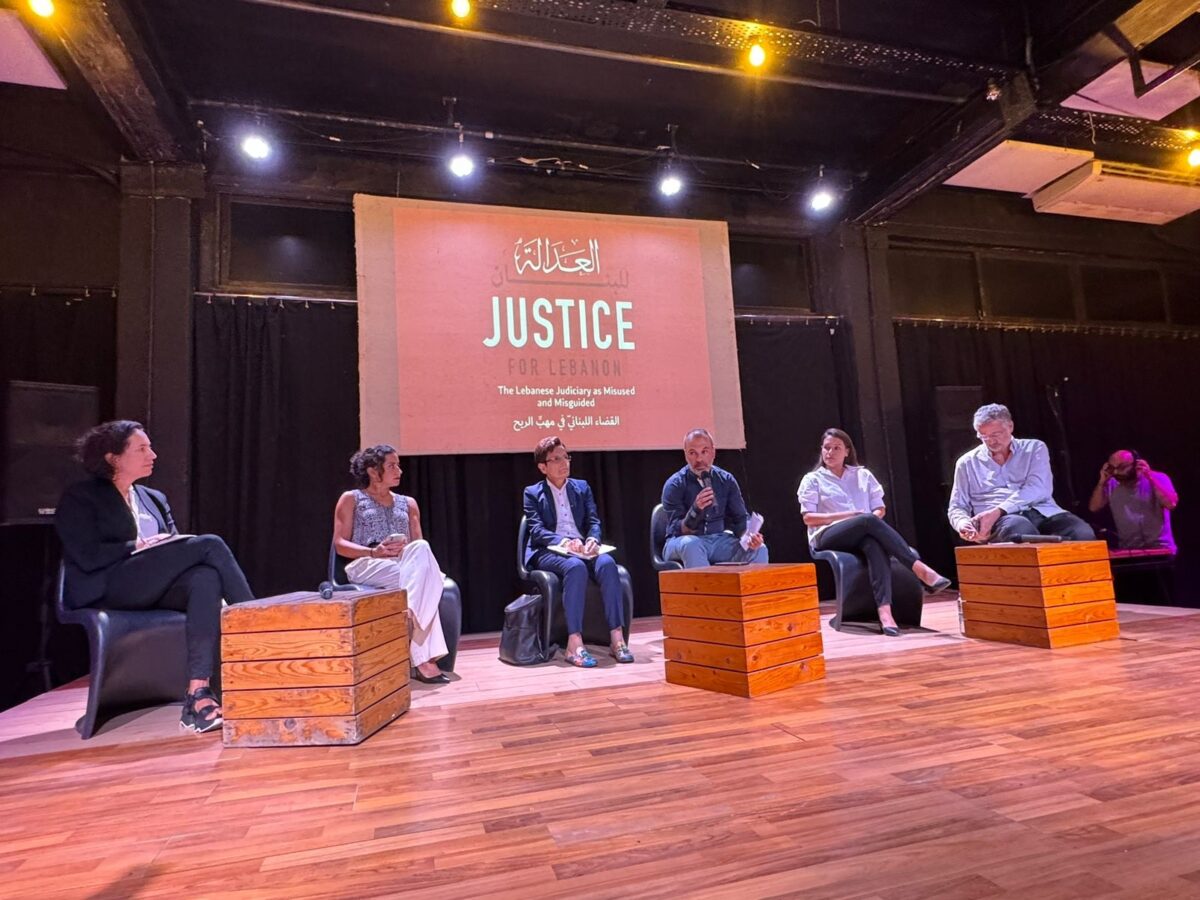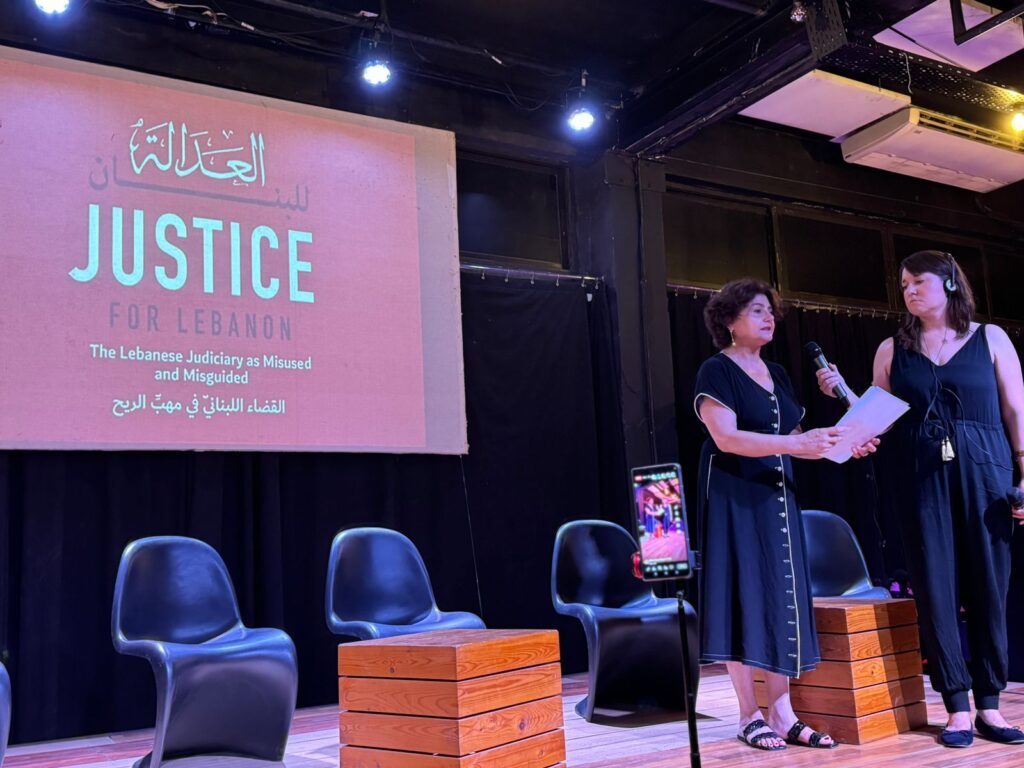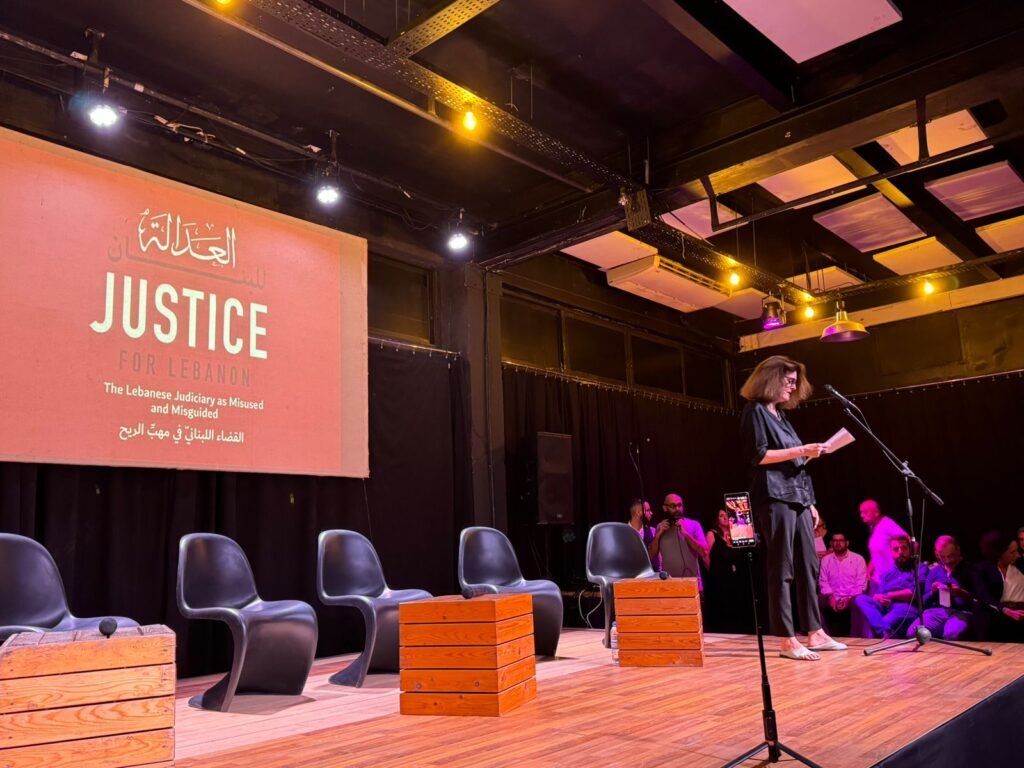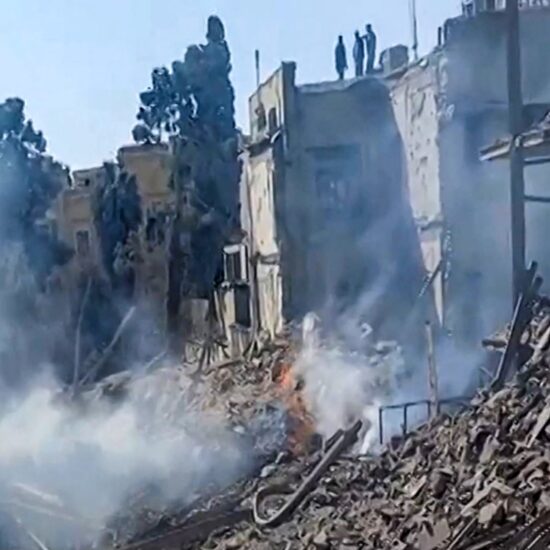
From August 4 Beirut Blast to the assassination of Lokman Slim: the broader struggle for justice in Lebanon amid political influence, lack of accountability and impunity. A path forward? On the World Day for International Justice, legal experts, activists, and stakeholders engaged in urgent dialogue about judicial reform in Lebanon
On July 17, the World Day for International Justice, a pivotal roundtable discussion on the Lebanese justice system took place at Station Beirut (Jisr El Wati). Organized by UMAM Documentation and Research, the Lokman Slim Foundation, and Dar Al Jadeed, in collaboration with the Heinrich Boell Stiftung – Middle East Office, the event drew legal experts, activists, and stakeholders to engage in urgent dialogue about judicial reform in Lebanon.
The event centered around the latest report by the Lokman Slim Foundation, titled “The Lebanese Judiciary as Misused and Misguided,” authored by lawyer Farouk El Moghraby. The report explores the systemic issues plaguing the Lebanese judiciary and presents recommendations for necessary reforms. The roundtable aimed to dissect the profound impact of these legal dynamics on social and civil society.
Key Event Highlights

Rasha Al Ameer, Director of Dar Al Jadeed
The event kicked off at 5:30 PM with registration and a book fair organized by Dar Al Jadeed, offering attendees a chance to browse through a curated selection of publications related to legal and human rights issues.
At 6:00 PM, the audience was addressed by Monika Borgmann-Slim, Director of UMAM Documentation & Research; Rasha Al Ameer, Director of Dar Al Jadeed; and Anna Fleischer, Director of Heinrich Böll Stiftung Beirut – Middle East. Each speaker underscored the critical need for judicial reform and the role of civil society in driving these changes.
A significant part of the discussion focused on the aftermath of the August 4, 2020, Beirut Port explosion, which devastated large parts of the city, killed over 200 people, injured thousands, and displaced countless others. Despite the magnitude of this tragedy, there has been a glaring lack of accountability. Investigations have been marred by political interference, delays, and a judiciary seemingly unable or unwilling to bring those responsible to justice.
Aya Majzoub’s presentation starkly highlighted these issues, pointing out that nearly three years after the explosion, no senior officials have been held accountable, and the victims and their families are still awaiting justice. This case exemplifies the broader failures of the Lebanese judicial system and underscores the urgent need for comprehensive reforms to restore public trust and ensure accountability.
The evening concluded with a friendly gathering on the rooftop, where attendees celebrated Lokman Slim’s birthday, fostering a sense of community and solidarity among those committed to the cause of justice in Lebanon.
This landmark event underscored the urgent need for judicial reform in Lebanon, aiming to galvanize efforts towards a more transparent, independent, and effective judiciary.
The Beirut Port Explosion: A Case of Impunity
On August 4, 2020, a catastrophic explosion at the Port of Beirut resulted in the deaths of 217 people, injured 7,000, and displaced 300,000 residents. The blast, caused by the detonation of 2,700 tons of ammonium nitrate stored unsafely in Warehouse 12, caused extensive damage to Beirut, with economic losses estimated between 3.8 and 4.6 billion dollars.
The investigation into the explosion has been hampered by political interference and a lack of judicial independence. Despite the overwhelming evidence of negligence and corruption, no senior officials have been held accountable. Political figures have used their immunity to avoid questioning, and the judiciary’s vulnerability to executive influence has further stymied progress.
“The most important thing is to reach the truth, and then justice,” Farouk El Moghraby told NOW, highlighting the judiciary’s critical role in the aftermath of the explosion. “We are at rock bottom. Judges earn 300 dollars, which makes them susceptible to blackmail. Lawyers are in a similar position, and the entire judicial system is financially strained. This leads to significant political interference.”
Lokman Slim: A Silenced Voice for Justice

Monika Borgmann-Slim, Director of UMAM Documentation & Research
The assassination of Lokman Slim on February 4, 2021, has further underscored the dangers faced by those who challenge the status quo in Lebanon. Slim, a prominent critic of Hezbollah and advocate for freedom of speech, was kidnapped and murdered after leaving a friend’s house in south Lebanon. His body was found riddled with bullets, a grim testament to the risks faced by dissidents in Lebanon.
Slim had been vocal about threats to his life, attributing them to Hezbollah and Amal movement’s leaders. His murder, coming 14 months after these threats were made public, has led to widespread calls for an independent investigation. His family has renewed calls for a United Nations fact-finding mission to investigate not only his assassination but also its potential links to the Beirut Port explosion.
Both cases illustrate the broader struggle for justice in Lebanon. The Lebanese judiciary, heavily influenced by political élites, has shown itself unable or unwilling to pursue accountability in these high-profile cases. The lack of judicial independence has allowed those in power to act with impunity, leaving victims and their families without recourse.
The international community has also weighed in, with the US Ambassador Dorothy Shea condemning the impunity enjoyed by perpetrators of such crimes and renewing calls for justice.
A Path Forward?
Reforming Lebanon’s judiciary is a monumental task that requires a complete overhaul of the current system. This includes ending political interference in judicial appointments, lifting immunity for public officials, and ensuring that judges can operate without fear of retribution. Such changes are crucial for restoring public confidence in the legal system and ensuring that justice is served.
As Lebanon prepares for upcoming elections, there is a glimmer of hope that new political leaders might prioritize these reforms. However, deeply entrenched clientelistic practices and a culture of corruption present significant obstacles. The Beirut Port explosion and the assassination of Lokman Slim serve as stark reminders of the urgent need for judicial reform in Lebanon.
“The first step is to ensure the independence of the judiciary and provide financial support so it can function independently and effectively,” El Moghraby emphasized. “Lebanon is in chaos, plagued by corruption, with all parties contributing to the state’s collapse and interfering in the judiciary. We need an independent judicial system.”
Borgmann told NOW that the date holds significant meaning for her as it marks Lokman’s birthday. She plans to organize an annual event to commemorate his memory. Despite the likelihood that the situation in the country may not change drastically, she believes in the importance of continuing efforts to drive change and keep the discourse alive.
“I sometimes feel isolated in this endeavor, especially when I see the families of the victims of August 4, who often seem alone in their monthly protests. We need to change that and ensure we all feel supported,” she said.
Borgmann firmly believes that justice and accountability are crucial for Lebanon’s future. “Without justice and accountability, if the culture of impunity persists, we will continue to witness one crime after another. This is something I deeply believe. I hope for a substantial turnout on August 4.”
She also expressed concern about Lebanon’s judiciary. “Our judiciary is a catastrophe. While an independent judiciary is essential, Lebanon is currently a failed state. It will take time to rebuild and establish an independent judiciary.”
In the face of these challenges, the Lebanese people continue to demand accountability and justice. Whether their calls will be heeded remains to be seen, but the fight for a just and independent judiciary is more critical now than ever.








